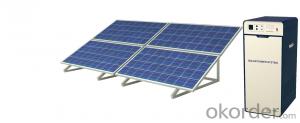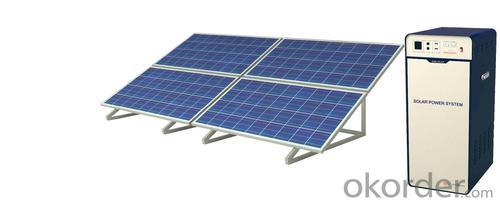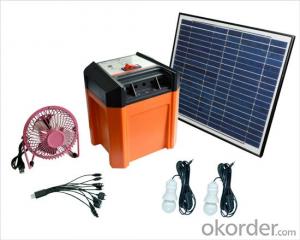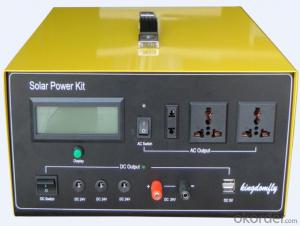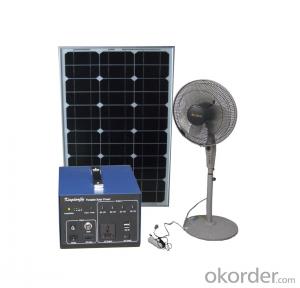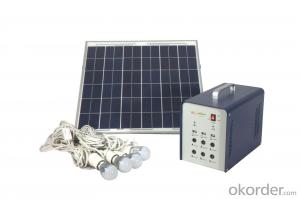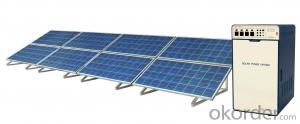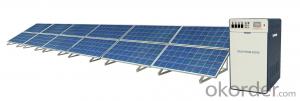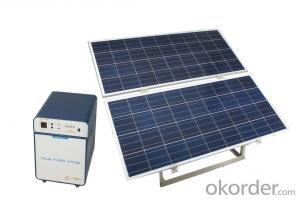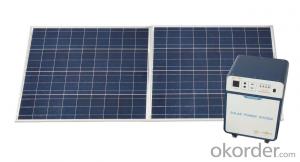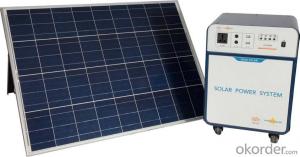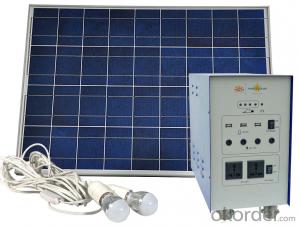Suntec Solar Energy Systems Off-Grid Solar Power System JS-SPS-1000
- Loading Port:
- Tianjin
- Payment Terms:
- TT OR LC
- Min Order Qty:
- 10 set
- Supply Capability:
- 10000 set/month
OKorder Service Pledge
Quality Product, Order Online Tracking, Timely Delivery
OKorder Financial Service
Credit Rating, Credit Services, Credit Purchasing
You Might Also Like
General Introduction
Solar power system provides alternating current and direct current, which is produced by the modules transforming solar power into power, to home lighting, household appliance and other DC appliance, such as cell phone and laptop.
Solar power system is widely used in area lack of power, for example house power supplying, monitoring, communication base, fire prevention in forest area, pasture and meadow, aquaculture etc.
We are dedicated to provide high quality off-grid PV products and systems to customers and has received a series of certificate, including ISO9001, TUV, UL, CE, CQC and RoHS.
Off-grid Solar Power System
High efficent PV module can produce more power.
Sine wave output is suitable for all kinds of load. Varieties of DC output, let it more
convenient for users.
The multifunction design make it easy to operation and maintenance.
Solar power system provides alternating current and direct current, which is produced by the modules transforming solar power into power, to home lighting, household appliance and other DC appliance, such as cell phone and laptop.
Solar power system is widely used in area lack of power, for example house power supplying, monitoring, communication base, fire prevention in forest area, pasture and meadow, aquaculture etc.
We are dedicated to provide high quality off-grid PV products and systems to customers and has received a series of certificate, including ISO9001, TUV, UL, CE, CQC and RoHS.
Off-grid Solar Power System
High efficent PV module can produce more power.
Sine wave output is suitable for all kinds of load. Varieties of DC output, let it more
convenient for users.
The multifunction design make it easy to operation and maintenance.
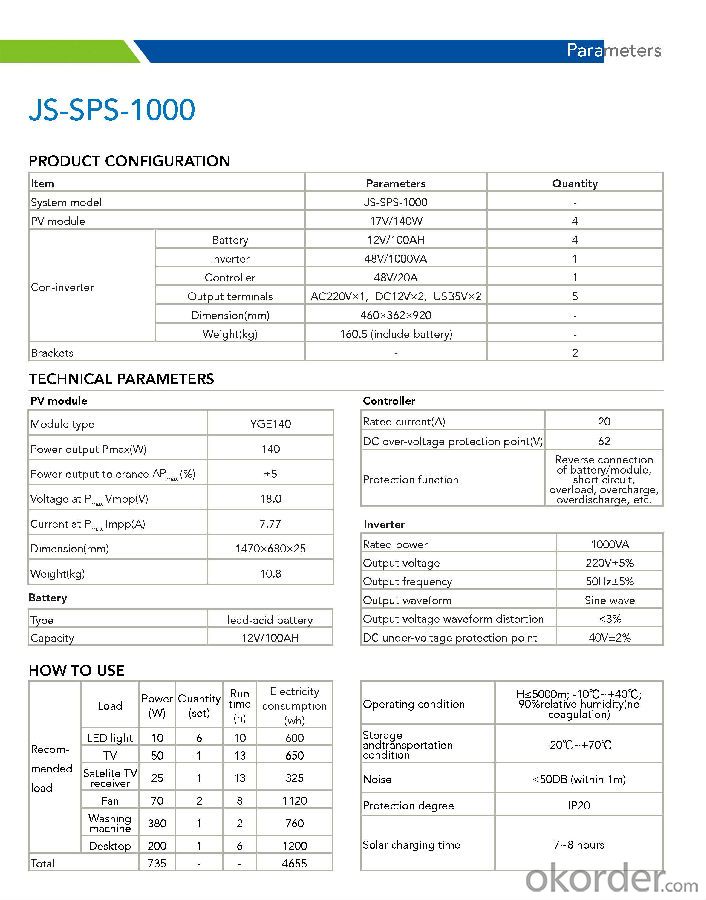
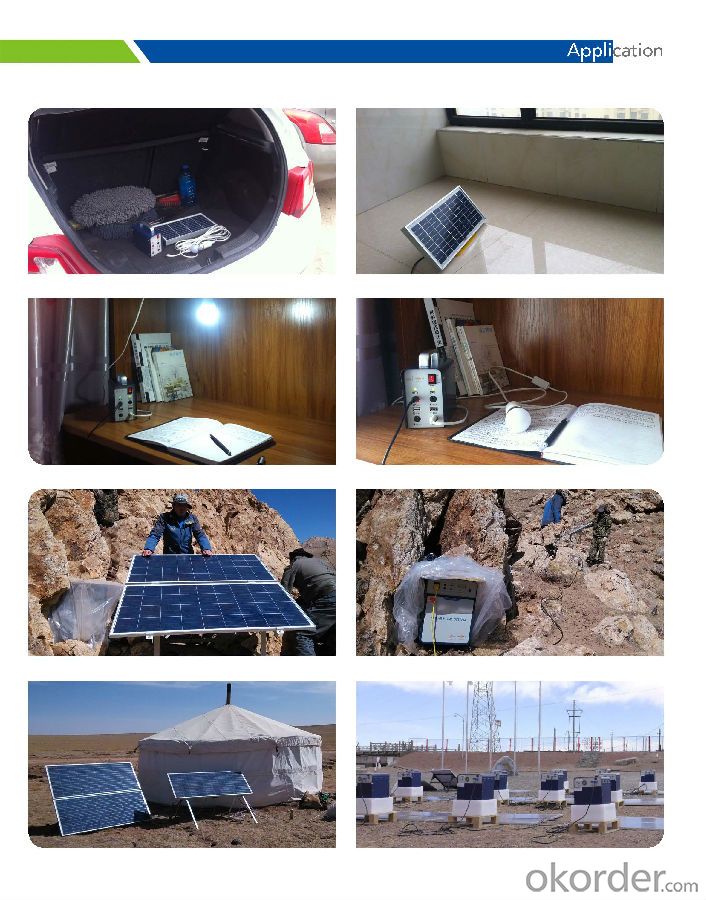

- Q: Are there any noise or pollution concerns with solar energy systems?
- Solar energy systems do not produce any noise pollution as they operate silently. However, when it comes to pollution concerns, solar energy systems have minimal environmental impact as they generate clean and renewable energy without emitting harmful pollutants into the atmosphere.
- Q: Can solar energy systems be used for powering agricultural machinery?
- Yes, solar energy systems can be used for powering agricultural machinery. Solar panels can generate electricity that can be used to power various agricultural equipment such as irrigation pumps, tractors, and crop dryers. This helps reduce the dependence on fossil fuels and lowers operating costs for farmers while promoting sustainable and eco-friendly farming practices.
- Q: How do solar energy systems affect carbon footprint?
- Solar energy systems can significantly reduce carbon footprint as they generate electricity without burning fossil fuels. By harnessing the power of the sun, solar energy systems produce clean, renewable energy, thereby reducing greenhouse gas emissions and mitigating climate change. By switching to solar, we can decrease our reliance on carbon-intensive energy sources and help create a more sustainable and eco-friendly future.
- Q: What are the advantages of using solar energy?
- There are several advantages of using solar energy. Firstly, it is a renewable and abundant source of energy, meaning it will never run out. Solar energy is also environmentally friendly as it does not produce any harmful emissions or pollution during operation. Additionally, solar energy can help reduce electricity bills as it allows homeowners and businesses to generate their own electricity. It also provides energy independence, as it reduces reliance on fossil fuels and the grid. Moreover, solar energy systems are low maintenance and have a long lifespan, making them a cost-effective investment in the long run. Overall, the advantages of using solar energy include sustainability, environmental benefits, cost savings, and energy independence.
- Q: Can solar energy systems be used in areas with limited access to solar inverters?
- No, solar energy systems cannot be effectively used in areas with limited access to solar inverters. Solar inverters are an integral part of solar energy systems as they convert the direct current (DC) generated by solar panels into alternating current (AC) that can be used to power electrical devices. Without inverters, solar energy cannot be utilized efficiently, making it impractical to implement solar systems in areas with limited access to solar inverters.
- Q: How does the efficiency of solar panels affect the performance of a solar energy system?
- The efficiency of solar panels plays a crucial role in determining the overall performance of a solar energy system. Higher efficiency panels are able to convert a greater amount of sunlight into electricity, resulting in increased energy production. This means that with more efficient panels, a solar energy system can generate more power and meet a greater portion of the electricity demand. One of the primary benefits of using highly efficient solar panels is that it allows for a smaller system size. Since more electricity is being produced per unit of panel area, fewer panels are needed to achieve the desired energy output. This not only saves installation space but also reduces the overall cost of the system. Additionally, a smaller system size means less maintenance and fewer potential points of failure, improving the reliability and longevity of the solar energy system. Furthermore, the efficiency of solar panels directly impacts the economic viability of a solar energy system. Higher efficiency panels generate more electricity, which can offset a greater portion of the energy consumption, resulting in reduced utility bills. In some cases, excess electricity can be fed back into the grid, allowing for net metering or even earning credits, further enhancing the financial benefits. A more efficient solar energy system can also provide a quicker return on investment, making it a more attractive option for homeowners and businesses alike. Moreover, the efficiency of solar panels has a significant impact on the environmental benefits of solar energy systems. By converting more sunlight into electricity, highly efficient panels can reduce the reliance on fossil fuel-based power generation, thus decreasing greenhouse gas emissions and contributing to a cleaner and more sustainable energy future. This positive environmental impact is crucial in combating climate change and minimizing the ecological footprint associated with energy consumption. In summary, the efficiency of solar panels directly affects the performance of a solar energy system. Higher efficiency panels lead to increased energy production, smaller system sizes, reduced costs, and improved financial returns. Moreover, they contribute to a more sustainable future by reducing reliance on fossil fuels and lowering greenhouse gas emissions. Therefore, investing in highly efficient solar panels is essential for maximizing the effectiveness and benefits of a solar energy system.
- Q: What is the role of batteries in solar energy systems?
- The role of batteries in solar energy systems is to store excess energy generated by the solar panels during the daytime for use during nighttime or periods of low sunlight.
- Q: Can solar energy systems be used in areas with high levels of poverty?
- Yes, solar energy systems can be used in areas with high levels of poverty. In fact, solar energy is often considered a viable solution for providing affordable and sustainable electricity to underserved communities. Solar power can reduce reliance on traditional energy sources, lower energy costs, and provide a reliable source of electricity even in remote areas. Additionally, solar energy systems can be implemented on a small-scale basis, allowing individuals and communities to gradually adopt this renewable energy source according to their needs and financial capabilities. Overall, solar energy has the potential to greatly benefit areas with high levels of poverty, promoting economic development and improving living conditions.
- Q: Are there any financial incentives for installing solar energy systems?
- Yes, there are several financial incentives available for installing solar energy systems. These incentives include federal tax credits, state and local rebates, grants, and loan programs. Additionally, installing solar panels can lead to long-term cost savings on electricity bills, as solar energy is renewable and reduces reliance on traditional energy sources.
- Q: How do I calculate the return on investment for a solar energy system?
- To determine the return on investment (ROI) of a solar energy system, several factors need to be taken into account. Firstly, the initial cost of the system, including the expenses associated with purchasing and installing solar panels, inverters, wiring, and any additional equipment or installation charges, must be calculated. Next, it is crucial to estimate the annual savings or income generated by the system. This can be achieved by assessing the amount of money saved or earned each year by utilizing solar energy instead of relying solely on conventional energy sources. To do this, one can estimate the kilowatt-hour (kWh) production of the system and multiply it by the local electricity rate. Additionally, potential feed-in tariffs or tax credits that may be applicable should be taken into consideration. Afterwards, the payback period needs to be determined. This involves dividing the initial cost by the annual savings or income to ascertain how many years it will take to recoup the investment. For instance, if the initial cost amounts to $20,000 and the annual savings are $2,000, the payback period would be 10 years ($20,000 / $2,000). Finally, the ROI can be calculated. Once the payback period is established, it can be subtracted from the projected lifespan of the solar energy system. The remaining years should then be divided by the payback period and multiplied by 100 to obtain the ROI percentage. For example, if the anticipated lifespan is 25 years and the payback period is 10 years, the ROI would be 60% ((25-10) / 10 * 100). It is important to note that this calculation serves as an estimation and does not take into account factors such as maintenance costs, inflation, or fluctuations in energy prices. Additionally, it is advisable to consider other benefits such as reduced carbon footprint and increased property value when evaluating the ROI of a solar energy system.
Send your message to us
Suntec Solar Energy Systems Off-Grid Solar Power System JS-SPS-1000
- Loading Port:
- Tianjin
- Payment Terms:
- TT OR LC
- Min Order Qty:
- 10 set
- Supply Capability:
- 10000 set/month
OKorder Service Pledge
Quality Product, Order Online Tracking, Timely Delivery
OKorder Financial Service
Credit Rating, Credit Services, Credit Purchasing
Similar products
Hot products
Hot Searches
Related keywords
